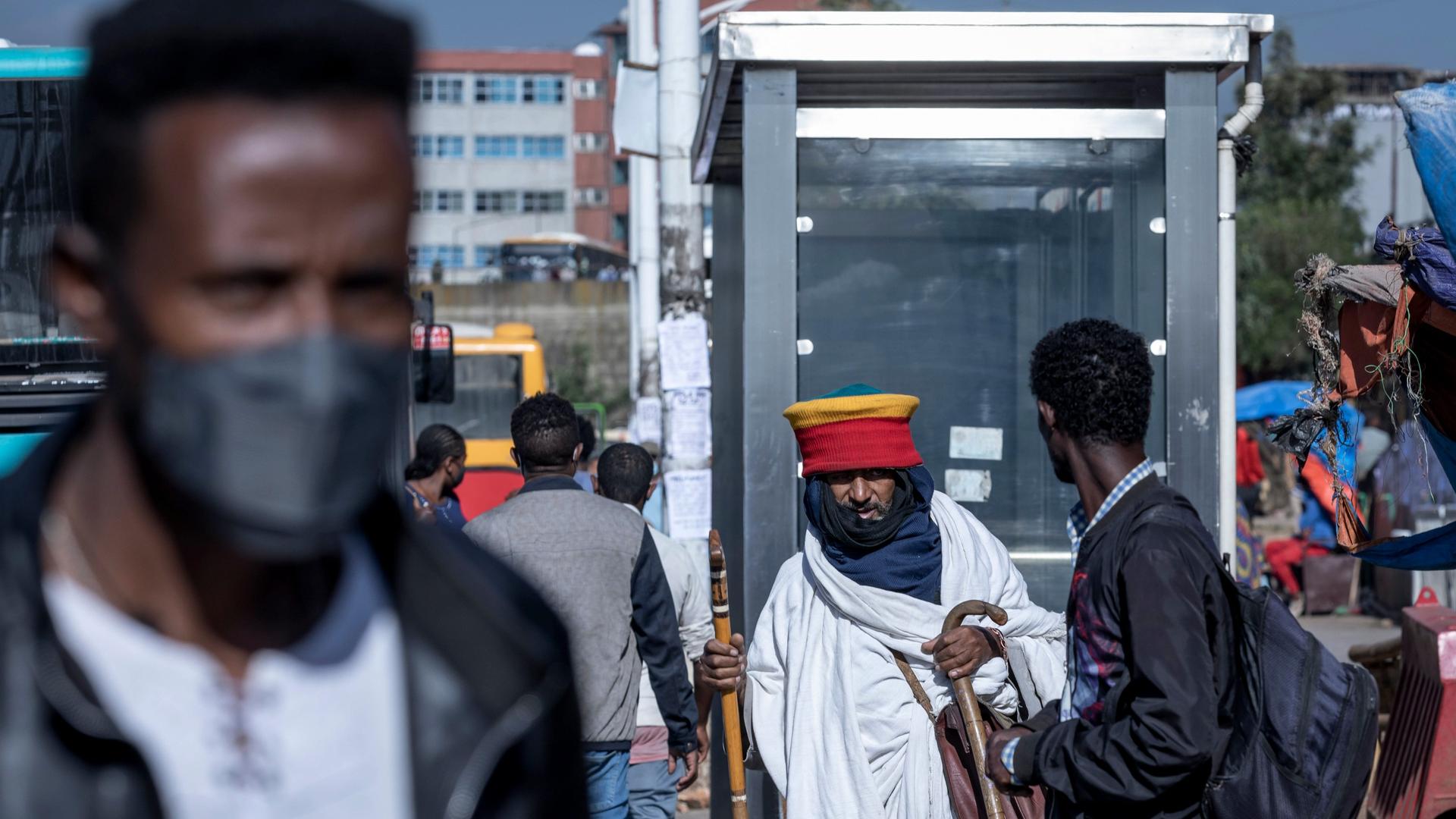After claiming victory in the months-long conflict in Ethiopia’s northern Tigray region, Prime Minister Abiy Ahmed has called for reconciliation and unity. But reports of ethnic profiling against ethnic Tigrayans threaten to undermine that message.
One young Tigrayan businessman recalls being prevented from leaving the country the morning after the conflict began on Nov. 3.
“I frequently travel abroad. But on that day, they asked me to show a kebele ID,” said the businessman, who asked not to be named out of fear of being targeted by the police.
He wasn’t carrying his “kebele” card — named for the issuing “neighborhood” — which is a national identification and citizenship card that lists one’s ethnic group. Instead he showed his passport to security officials at the airport. They said he could not travel.
“They looked at my name. And my name, especially from my father’s side, is a Tigrayan name,” he said. “What they told me after that was, ‘You can pass when you finish your struggle. Your relatives are the one who spend the night beheading people’.”
Related: As Ethiopia’s conflict rages, ethnic targeting turns deadly
The businessman says he has never been associated with the Tigray People’s Liberation Front (TPLF), the once-dominant political force in Ethiopia that is now embroiled in conflict with the federal government. The TPLF headed the country for more than two decades until 2018, when Abiy Ahmed came to power following nationwide protests in Amhara and Oromo regions.
Ahmed hails from the Oromo people, who comprise about one-third of the population and are the largest ethnic group. The Amhara people comprise around 28% of the country, while Tigrayans are about 7%. A number of smaller ethnic groups constitute the remainder.
‘Tears coming into my eyes’
The World also interviewed the businessman’s friend, another businessman who is ethnically Amhara and witnessed the events. They were both traveling together.
“My reaction on the spot was that I felt very bad. I did not expect such a thing to happen,” began the Amhara businessman. “What if it happened to me? There were tears coming to my eyes.”
He said had faced discrimination once when he was living in Tigray, but he could never imagine someone being stopped from boarding a plane due to their ethnicity.
“Now the Tigrayans are facing this situation. But after all this is over, maybe tomorrow Amharas will be discriminated against. You don’t get to choose what ethnic group you are born into,” he said.
Related: Ethiopia’s Tigray leader confirms firing missiles at Eritrea
Since the onset of the conflict, many Ethiopians have made similar complaints of ethnic profiling, says Aaron Maasho, senior advisor and spokesperson for the Ethiopian Human Rights Commission (EHRC).
“Many Ethiopians of Tigrayan origin were being prevented from traveling abroad or domestically. You have many claiming that they have been either laid off or asked to stop appearing at work,” he said, noting that this type of targeting is illegal.
Hundreds of arrest warrants have been issued against military personnel and civilians suspected of being involved with the TPLF, but ordinary Tigrayans have claimed they too are being targeted in arrests and house raids.
“These are complaints we take very seriously,” said Ethiopia’s attorney general, Gideon Timothewos, during a recent news conference.
“We understand that there could be isolated instances and instances where police officers might have acted out of line, out of bounds,” he said.
‘Is Ethiopia your home country?’
But the Tigrayan businessman claims ethnic profiling of Tigrayans has been happening since Abiy Ahmed came to power in 2018.
During his administration, Abiy has pushed a transformative reform agenda, aimed at unifying a fractured country.
The Tigrayan businessman told The World the opposite has happened.
“Before, I identified myself as a person from Addis Ababa. But now I am not thinking that way. If you ask me, ‘Is Ethiopia your home country?’ My answer now will be, ‘I don’t think so,” he said.
“Before, I identified myself as a person from Addis Ababa. But now I am not thinking that way. If you ask me, ‘Is Ethiopia your home country?’ My answer now will be, ‘I don’t think so.”
The accusations of ethnic profiling also come amid growing ethnic violence across the country.
In November, more than 600 people were killed in the Mai Kadra town in Tigray. An investigation by the EHRC investigators found a Tigrayan youth group “aided and abetted” by local administrators and the security establishment to be responsible. Days later, more than 30 people were killed in a bus attack in Benishangul-Gumuz.
Allegations of ethnic profiling from government officials and law enforcement are not helping ethnic tensions, says Aaron Maasho. “At a time where we have ethnic divisions in the country, it has the potential to further exasperate divisions,” he said.
Maasho notes, however, that there are some positive signs that the government is taking the issue seriously.
Related: Ethiopia’s conflict spills over border as thousands flee
Ethiopia’s attorney general has said that police will create a hotline to receive complaints, an option the Tigrian businessman said he doesn’t plan to use. He doesn’t trust the government and is pessimistic about the path Ethiopia is going.
Still, when he thinks back to the events at the airport, he tells The World that he was heartened by the reaction from other Ethiopians that day.
“It was amazing. Many people were shocked. They shared encouraging words. Even one friend told me, ‘If you are not traveling, then neither am I.’ So, I told him, ‘Don’t worry. This will pass’.”
His Amhara friend confirmed that on the plane ride, this was all anyone could talk about.
Our coverage reaches millions each week, but only a small fraction of listeners contribute to sustain our program. We still need 224 more people to donate $100 or $10/monthly to unlock our $67,000 match. Will you help us get there today?
